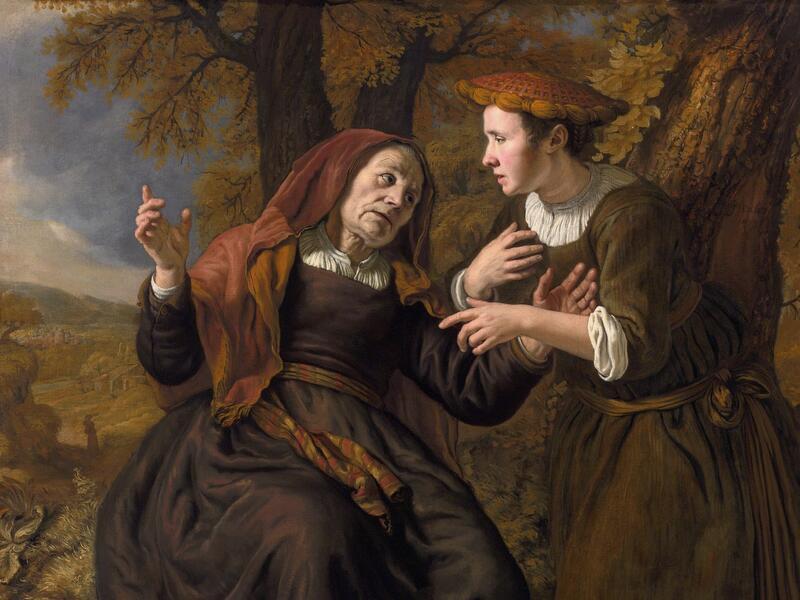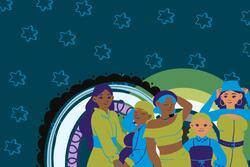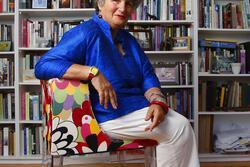Asexuality: A Text Study
Content warning: This piece mentions self-harm.
Have you ever felt the earth tremble? I haven’t. I’ve never experienced an earthquake, and I’ve never experienced the terror or excitement of a “sexual awakening.”
While analyzing part of Exodus in an LGBTQIA+ text study class with Jewish young professionals group a few years ago, we focused on God’s dramatic entrance over Mount Sinai in preparation for the giving of the Ten Commandments. This, everyone agreed, was a major diva move. It was obviously a choice on God’s part to make the ground tremble and the smoke appear. The rabbi leading the session compared the terror and excitement that so often comes with God’s revelation as something akin to a “gay awakening.”
That was where the class lost me.
In my first middle school health class, the teachers talked about new “feelings” we were all going to have. They said we were going to look at the people around us in new ways. The assumption was implicit: Sooner or later, we would all feel the pull to have sex. The day was coming—that’s why we needed education, a way to talk about these feelings. And we needed to start right away.
For me, that day never came.
***
“Would you sleep with him?”
When my friend asks the question, Harrison Ford is 62 and I am 15, and this is the type of thing teenagers talk about. I love Harrison Ford’s movies, but I never considered sleeping with Han Solo or Indiana Jones. I want to hang out with them, be near them. But that’s not what anyone is asking when you play “Bang, Marry, Kill.”
I fell in love with Harrison Ford when I was five years old and watched Star Wars for the first time. Han Solo is the person I wanted to be around every moment of every day. He was sarcastic, charming, a man of many skills, whether flying or fighting, and yet he was relatable because he was far from perfect. He had the best costume and sidekick, and a winning lopsided grin, along with the best ride. But even back then, I knew being in a couple with a man like Han Solo was never going to be possible; even though “Bang” and “Marry” were different options in the same game, I understood that in real life, they were usually presented as going together.
I have never looked at a person and thought, Yes, that is someone I want to know in the biblical sense. I have never felt that type of attraction. I know who I think is attractive (that’s known as “aesthetic attraction”) but when I think about a relationship, what I imagine has much more to do with wanting to be near someone and connect with them (often part of romantic attraction, but not always), enjoy their company, and build a meaningful attachment.
Is there an opposite to a sexual awakening? What do you call it when you never awaken, you just continue to slumber? And then realize that this, too, is a clear realization and recognition of who you are?
That’s why discovering the word “asexual” was so important for me. When I first heard the term in graduate school, it had never occurred to me that having no feelings of sexual attraction was an option. The realization was scary, but it didn’t come with rumbles and fireworks and smoke; it came quietly, and without an audience.
***
“When was the last time you had sex?”
The question comes from a classmate three weeks into graduate school, while we’re seated at a bar. I am 24. It’s not an inappropriate question. This is the 2010s, a liberated time. This is a subject that is discussed. We are creatives, after all, working towards our MFAs in fiction writing. When was the last time you saw a movie or listened to a song that didn’t at least imply sex?
I evade with a vague answer. I say, “in college.” I am honest. But that means, at the very least, it has been three years.
I wasn’t counting, because I rarely thought about it. Only when someone showed interest at a party or a bar, and it was clear they were looking for more than excellent conversation, did the thought of sex even enter my mind. Because isn’t everyone looking for more? Everyone except me, I thought.
Two years after I finished graduate school, I was 28 and my boyfriend proposed marriage. We were on our first big trip together, far from home in a foreign country. To me, it felt like we had skipped a few steps. We’d never seriously discussed intimacy, children, where we would live, or what our hopes and dreams were. I was not yet identifying as asexual, even to myself, but in terms of intimacy, we had never talked about our likes, our desires—or lack thereof. We had been dating for only a year.
The life he envisioned by proposing, staying where we were, doing the same jobs, but adding a house and children and sex, was not what I envisioned. How could his vision feel right when we had never talked about any of those things? Or ever discussed my history of depression and anxiety? We didn’t talk about what getting married would mean for us. The only time he mentioned the idea was when he was down on one knee.
After I said “yes” in front of a very large crowd in a very public space—afraid to say something other than what was expected, afraid to spend three more days and an international flight with a person I had turned down—I began to cut at my wrists. I didn’t know what else to do. I couldn’t say anything, because I feared taking back my “yes” would make him hurt as much as I already did. But when I told my parents I’d been thinking about killing myself for two weeks, because I was certain that would hurt him less than turning down the proposal, they told me I was very wrong.
I didn't really want to die. I was just afraid of his judgment. I was afraid he wouldn’t understand why I didn’t want to get married, or what I was beginning to understand about my own sexuality. And I was afraid of the judgment of others, the few I had already told about the engagement, if I called it off. In books, movies, and TV shows, sexual attraction and marriage were key parts of love, and led the way to happiness. But I know now there are many different kinds of love, and the most important is often not the kind that “sells.” It isn’t the kind my grandparents asked about, or that friends hinted at with giggles and grins. It didn’t have to be about whom you had sex with or whom you married. I realized there are other options. And I opted to end my short-lived engagement.
Several years later in the LGBTQIA+ text study class, we began to discuss the relationship between Ruth and Naomi in the Book of Ruth. The Book of Ruth is usually studied during the Jewish holiday of Shavuot, which often falls in June, like Pride. I connected much more to their story than to the terror and excitement of God’s revelation of the Ten Commandments. The story follows Ruth, who converts to Judaism for marriage, and her relationship to her mother-in-law, Naomi. After Ruth’s husband dies, Naomi decides she will return to her people in Bethlehem, and tells Ruth she should also return to her own family. Ruth, however, refuses to leave Naomi, saying, “Where you go, I will go; where you stay, I will stay.”
In class, I made the point that, even without any implication of a sexual relationship, the relationship between Ruth and Naomi could still very much be read as queer. No matter how they define their relationship, they have created a chosen family. This is an experience many queer people can relate to, no matter how they define their sexual orientation.
My comment was warmly embraced by the class. For the first time, I felt fully comfortable as a member of the discussion group. I also felt, for the first time, that my membership in the LGBTQIA+ community was fully embraced. Asexuality was another option, and a valid one.
Still, even today, almost two years after that text study class, and despite being a member of both the LGBTQIA+ and Jewish communities, I rarely hear people in those communities having discussions I can relate to when it comes to relationships. And the mainstream media certainly isn’t connecting with me or representing me in a meaningful way. Many events for Jewish young adults focus on pairing people off, with the ultimate goal of fostering traditional marriages in order to produce another generation of Jews (“Be fruitful and multiply”), rather than simply building meaningful connections with other Jews. It’s a sign of real progress that rabbis now marry same-sex couples and Jewish institutions host LGBTQIA+ affinity groups. But I hope that progress can continue to include more kinds of relationships and ways of being, and that people like me will be better represented and included.
I came out as asexual a little over two years ago, though I had known the word since graduate school and had considered it privately for a long time. Coming out involved a lot of education, not just for me, but for the people around me. I tried to explain an entire orientation to family, friends, and even physicians. The “A” in LGBTQIA+ does not, as many people think, stand for ally, but covers several identities including the umbrella terms “asexual” and “aromantic.” And yes, those terms are different. An aromantic person is someone who feels little or no romantic attraction. An asexual person is someone who feels little to no sexual attraction. Someone can be either aromantic or asexual or both. Many people don’t even consider their romantic and sexual attractions as separate; they see them as being one and the same, very much intertwined, and inextricably so. While they can certainly be connected, they are still separate types of attraction. Both asexuality and aromanticism exist on a spectrum.
I am aware that the discourse around asexuality has only recently hit the mainstream. My own education about how I define myself continues. It still feels hard to find my place, even in groups to which I supposedly “belong.” The focus on hookup culture, no matter who attracts you, or how you are attracted, is often where discussions around relationships and sexuality begin. It’s never about who you want to talk to or hang out with; it begins with “Which of these people would you kiss?” and grows from there. But what happens when a kiss is not the first thing you think about? Not the first thing you find yourself wanting?
***
“Maybe you just haven’t met the right person?”
The question finds me when I finally know just enough to answer in a meaningful way. A friend asks when I am three years removed from contemplating suicide and months removed from coming out. I have come out to my family and have just written my first essay about what being asexual means to me. I am able to say, “No, I know what I want, and it has never been that.” I have never felt that sex is something I want, only something I might have to do. Now I know that’s not true. I can want someone to belong to and with. I can want to feel safe and loved without that including sex. Because “asexual” is a word. And if there’s a word, there’s a meaning, and that means I can want something different than what the songs and movies say.








Dear Jessie,
Thank you for your courage in sharing your journey of self discovery. A very honest and insightful reading experience.
Your midrash on the parsha Ruth was broadening the scope of dialogue of agape love.
I would like to share it with my asexual clients with your permission.
Cindy Goldberg Newman, MA, LMFT
This is so beautiful. Thank you so much for sharing this powerful and personal story.
As someone who also identifies with the ace spectrum (in who knows what way, but definitely some way), I found this connection to Jewish life very moving. I also wrote an essay on Ruth and Naomi in college and discussed the idea of a deep and true love, sexual or not, between their characters. Their story, to me, opened up what Jewish relationships can be—it allowed for different readings, and new communities, and greater love and acceptance.
Again, thank you for this beautiful piece.